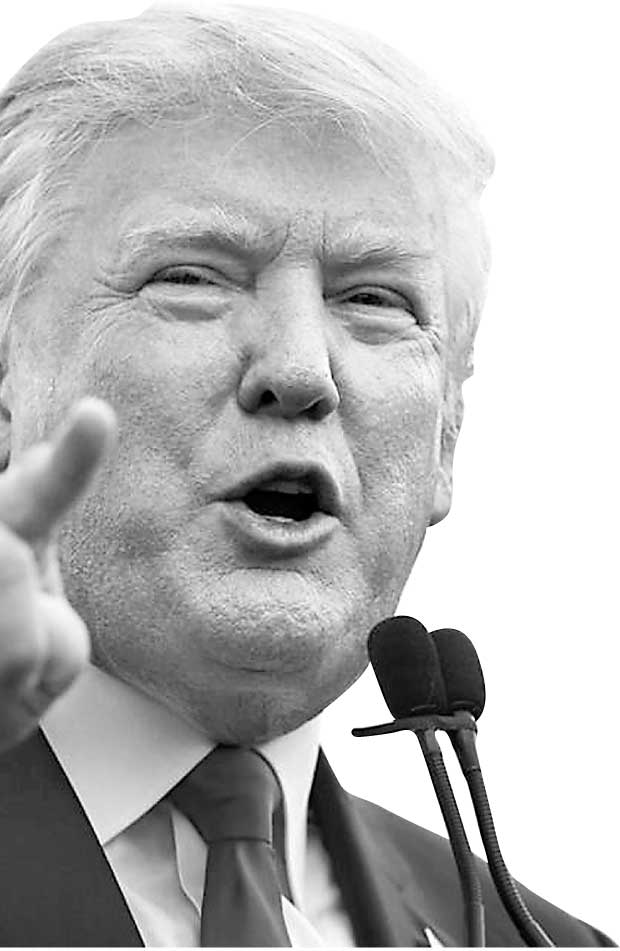Reply To:
Name - Reply Comment
Last Updated : 2024-04-26 18:26:00
 Last week’s main international story should have been the most anticipated meeting of the two global heavy weights, President Trump and President Xi. Many global leaders and analysts were keen to see how the two men both at their zenith of power, yet having quite different world views would interact and the fallout that may define global relations for years to come. This landmark meeting was overshadowed by key developments in Syria. Syria’s conflict has a generative dynamic to it, it is drawing more and more actors both state and non-state like a gigantic magnet.
Last week’s main international story should have been the most anticipated meeting of the two global heavy weights, President Trump and President Xi. Many global leaders and analysts were keen to see how the two men both at their zenith of power, yet having quite different world views would interact and the fallout that may define global relations for years to come. This landmark meeting was overshadowed by key developments in Syria. Syria’s conflict has a generative dynamic to it, it is drawing more and more actors both state and non-state like a gigantic magnet.
 The Syrian town of Khan Seikhoun in the Idlib province, which is the last remaining main Syrian rebel stronghold after the crushing defeat they suffered in December 2016 at the hands of Syrian Armed Forces backed by Russian military was the site of a major chemical attack last Monday. The images that came out of the aftermath of dead children painted a gruesome picture. While there was no clear evidence on how the attack unfolded, the Western narrative was that it was an attack carried out by Syrian forces loyal to President Bashar al-Assad regime. Russia took a clearly defiant stance against this popular view point.
The Syrian town of Khan Seikhoun in the Idlib province, which is the last remaining main Syrian rebel stronghold after the crushing defeat they suffered in December 2016 at the hands of Syrian Armed Forces backed by Russian military was the site of a major chemical attack last Monday. The images that came out of the aftermath of dead children painted a gruesome picture. While there was no clear evidence on how the attack unfolded, the Western narrative was that it was an attack carried out by Syrian forces loyal to President Bashar al-Assad regime. Russia took a clearly defiant stance against this popular view point.
Trump’s unilateral strike on Syrian air facility violates international laws, it undermines the United Nation’s Security Council, which are both symbolic of what may be coming in the near future with a marginalized or weakened United Nations system. A United States that once again ignores global norms, not keen to work through global institutions as the United States Ambassador to the UN, Nimratta (Nikki) Haley hinted that the US would not overlook unilateral responses. Reminds one of the Bush era undermining of the United Nations and signals American unilateralism in global affairs
Yet, the US missile attacks surprised some, intrigued many and was puzzling for the American voters who thought Trump was more interested in fixing problems at home as he himself was warning Obama not to intervene in Syria. Trump had been a critique of President Obama for even making the infamous ‘redline’ comment when Obama hinted he would use force against Syria in a similar chemical attack that was allegedly carried out by Syrian forces against a rebel held neighbourhood in eastern Damascus in 2013.

What does President Trump seeks to achieve in this unprecedented move of burning 60 million US dollars at one go by firing a million dollar-a piece missile solution 59 times? The consequences and implications maybe as follows.
Firstly, the non- interventionist America narrative goes down the drain or some call it the death of America first policy, as Trump blamed his predecessors, including George W. Bush, and Obama of unnecessary US involvement in global conflicts which led to serious financial implications at Home. The strike represents a United States that is ready for unilateral military strikes on perceived adversaries are a chilling addition to already instable international security architecture. The worlds is witnessing geo political rivalries, populist nationalisms and significant Asian militarization and Asian rivalries.
Secondly, the missile strikes bring Americans into a direct confrontational path with the Russians who had been involved in a large military campaign to support the Assad regime. Even during the presidential run up in 2016 Trump advocated non intervention in Syria, when Hillary Clinton called for no fly zones to be established on Syria skies. Some analysts argued if Clinton was to become the President, she would start the World War III with Russia hence was happy Trump won. Yet, Trump seems to ending his bromance with Putin prematurely, by taking the United States into a possible confrontation with Russia or by immersing in the conflict can lead to an unnecessary prolonging of the conflict resulting in more violence and regional instability.
Thirdly, the strike took place when the Chinese President was in his state visit to the United States, after coming from Finland, where he assured Finland of deep ties with China. Finland is already feeling the heat from a resurgent Russia. The US strike on Syria may seem as a stern warning to China about Trump’s intentions to project a more aggressive American foreign policy when it comes to the use of force. This may have unintended consequences as with many American security policy blunders from creating the current chaos in the middle east to being the handmaiden of ISIS terrorism that emerged from the fragile states of Iraq and Syria.
The Middle East (ME) and North African regions are going through significant crisis since the outbreak of the Syrian conflict. Syria is a tragedy that may create a defining rupture in global politics of the 21st century. Syria is the second fault line to weaken the existing global order, 9/11 was the first. With nearly more than 50% of its population uprooted, half a million deaths, nearly 5 million refugees that have fled the country, these refugees themselves are creating tensions within the region as well as far as Western Europe and northern America and even in Asia. They seem to be creating social concerns throughout many regions and leading to radicalization and militant attacks.
Last week also witnessed ‘lone wolf’ terror attacks in Sweden and Russia, the metropolis of Stockholm and St. Petersburg the sites of attacks. Both these attacks were carried out by individuals of Uzbek and Kyrgyzstan origins which is a sign of radicalization in the Central Asian regions that are affecting European security. These lone wolf attacks are all driven by inspiration from ISIS.
The ISIS phenomenon itself is a result of state failure in the ME, mainly of Iraq and Syria. Even Trump’s right wing nationalist friends in the European circles were stunned, Marine Le Penn tweeted, ‘Trump is wrong about thinking of military intervention in Syria’. Nigel Farage shared similar sentiments.

The big question is why the United States get involved directly in a conflict which had minimal national interest values, the war was good from an American perspective. It dragged all American enemies into a war that depleted each others resources. Hezbollah and Iranian military are heavily involved in fighting for Assad, many senior Hezbollah leaders and some Iranian generals killed. Russia is spending a lot of money and bleeding in Syria. Al-Qaida affiliates and ISIS fighters are fighting and dying thus all these deaths, destruction are from an American national interest perspective not a bad outcome.
Trump’s decision to strike Syria may have come from some recent domestic and international political compulsions from growing criticisms from his own support base about not getting things done. The unprecedented nuclear option taken in the US Senate to confirm the conservative Trump nominee Neil Gorsuch as a Supreme Court Judge to escalating revelations of Russian links with the Trump campaign and family business. It also signals the infighting raging within the Whitehouse between Bannon group and Jared Kushner loyalists.
The world is heading towards a game of thrones scenario, where populist uprisings, geo political confrontations and an American foreign policy that seems to mirror the impulsive nature of its new leadership is creating global trajectories that is becoming harder to predict and adjust. The choices for small powers like Sri Lanka are getting complex and challenging our diplomatic thinking radically. Do we have the strategic insight to comprehend these sudden changes in global politics? How well can we navigate such turbulence? These are questions that will dominate our foreign policy makers in time tom come.
Has Sri Lanka thought about the strategic security implications of this complex world, do we have a strategy to cope with the expansive geo political rivalry not just of United States and China but of China, India, of Saudi Arabia and Iran. All these countries have good relations with Sri Lanka but how are their power projections affecting us. Have we considered ethnic religious relations in Sri Lanka from a security dimension? While reconciliation is core to healing old wounds how do we deal with things like new forms of radicalization? Radical extremism is an alarming by product of systematic state failure and geo political rivalries among Islamic nations have we as a nation started to map these threat scenarios? These question need serious strategic considerations. If ignored, will make us all pay a heavy price.
The Writer is a Director, Bandaranaike Centre for International Studies (BCIS)

Add comment
Comments will be edited (grammar, spelling and slang) and authorized at the discretion of Daily Mirror online. The website also has the right not to publish selected comments.
Reply To:
Name - Reply Comment
US authorities are currently reviewing the manifest of every cargo aboard MV
On March 26, a couple arriving from Thailand was arrested with 88 live animal
According to villagers from Naula-Moragolla out of 105 families 80 can afford
Is the situation in Sri Lanka so grim that locals harbour hope that they coul

1 hours ago
3 hours ago